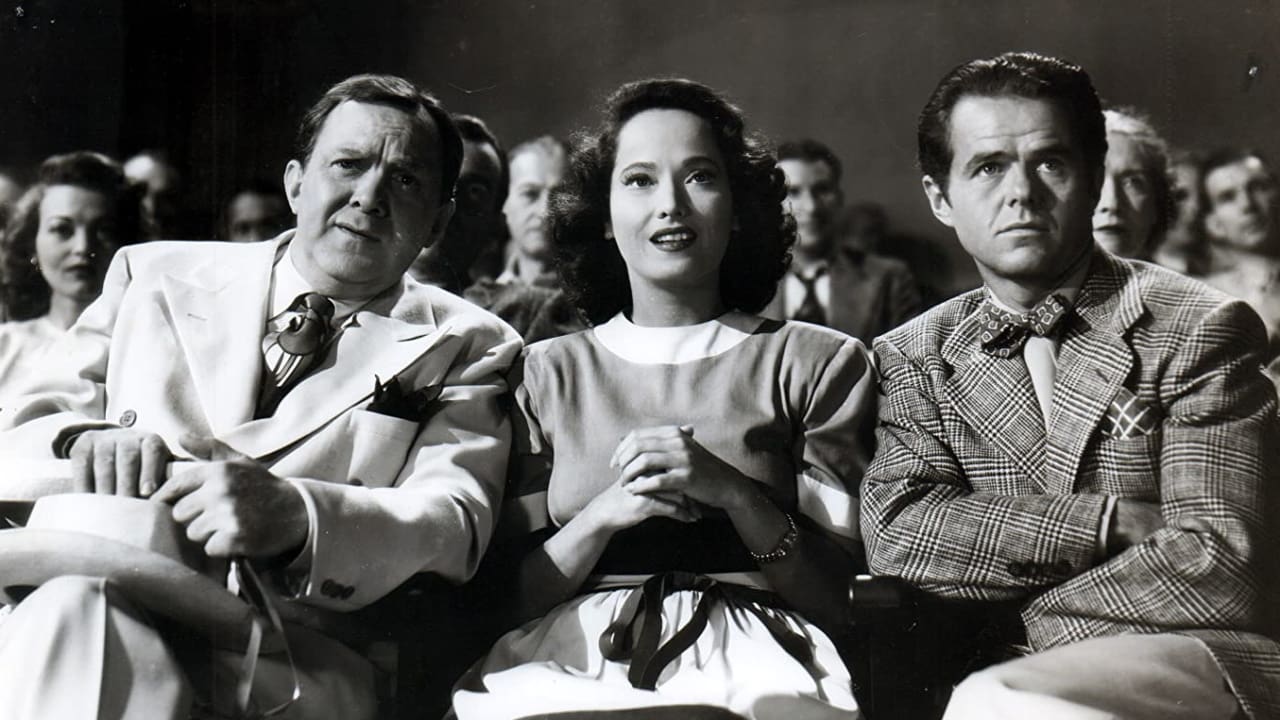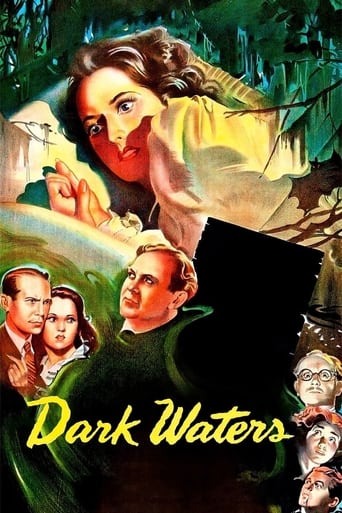

Don't Believe the Hype
... View MoreThe movie turns out to be a little better than the average. Starting from a romantic formula often seen in the cinema, it ends in the most predictable (and somewhat bland) way.
... View MoreWhile it doesn't offer any answers, it both thrills and makes you think.
... View MoreI think this is a new genre that they're all sort of working their way through it and haven't got all the kinks worked out yet but it's a genre that works for me.
... View MoreDark Waters is directed by André De Toth and collectively written by Marian B. Cockrell, Joan Harrison, Arthur Horman, John Huston and Francis M. Cockrell. It stars Merle Oberon, Franchot Tone, Thomas Mitchell, Fay Bainter, Elisha Cook Jr., John Qualen and Rex Ingram. Music is by Miklós Rózsa and cinematography by John J. Mescall and Archie Stout.After recovering from a traumatic boat incident that saw her parents killed, Leslie Calvin (Oberon) travels to the bayous of Louisiana to stay with her next of kin. But upon arrival it quickly becomes evident that nothing is as it seems...In 1944 Merle Oberon made two horror movies that very much relied on atmosphere and film noir visuality over any great semblance of psychological evaluation. With the far superior The Lodger rightly moving into classic territory as it boasted Laird Cregar, John Brahm and Lucien Ballard operating out of the top draw, Dark Waters, with its modest production values and second tier work force, feels like a B movie appetiser to Brahm's movie. Yet in spite of some overkill in the screenplay, there is much to enjoy here for the Gothic horror fan.Dark Waters is a fascinating thriller movie, it may play its hand far too early, and it really does, but the reverse plot device of having the lady protagonist be mentally troubled at the outset - only to have her grow in mental stability as the narrative unfolds - adds a non conformist kink to the picture. De Toth and his cinematographers fill the production with a feverish like dream state that picks away at the conscious, where although the woman in peril angle is slowly drawn out, the rewards are there to be had for those who like to see the visual surroundings mirror the mental health of the central character.The resolution, as was so often the case in olde classic movies trying to make mental health a viable issue, is cheap in the context of medicinal recovery. To that end it's a little frustrating viewing it these days to know that all we needed was some handsome/pretty cohort to get us through trauma! Yet in 1944 film makers were still trying to get to grips with a horror that didn't involve some monstrous creature moving through the landscape. There are many things wrong with Dark Waters when viewing it now, but if you can accept it as a 1944 movie and embrace it for its visual touches (and the makers do not disappoint with shadowy and spooky atmospherics), then it's a movie well worth taking an interest in. Besides which! Elisha Cook is in there being a shifty weasel, what more do you want in some Louisiana swamp based Gothic noir picture... 7/10
... View MoreMerle Oberon and her parents manage to escape by ship from the Dutch East Indies just before the islands are captured by the Japanese. They reach Madagascar but are denied visas. The ship is torpedoed and Oberon's parents are lost. She herself winds up in a lifeboat, all of whose passenger except four die of thirst. She's finally rescued and finds herself in Louisiana where she seeks refuge at a sugar plantation owned by an uncle and aunt she's never met. You can see she's been through a lot already.She's pretty shaky and her family at the plantation welcome her but they don't help much with Oberon's torment. "How does it feel to almost die at sea?", they ask. And, "Tell us all about how horrified you were when your parents drowned." The overseer joins right in. Oberon hears strange sounds at night. Her bedroom lamp seems to go on and off by itself. Someone is calling her name in a strange voice.Fortunately, she's met a doctor, Franchot Tone, from the town and he's a nice reliable sort who is attracted to Merle Oberson, as any normal man would be, what with her striking felinity and air of helplessness. After he visits her at the plantation a few times he asks her to marry him but she -- thinking she's going mad -- turns him down.At that point, I thought I heard a strange voice calling my name. My lights seemed to flicker on and off. A handsome young doctor proposes to a woman and she tells him to bugger off with no explanation. Yes, I must be going mad.But, no! Sane after all. The doctor returns, discovers the reason for his having been turned away, comes to believe that she's in jeopardy, and manages to save those startling and frightened cat eyes from a watery grave.Merle Oberon is pulchritudinous, no doubt about it. She's not a powerful actress, though, and neither is Franchot Tone, whose most engaging feature is his slightly theatrical but reassuring baritone, grown a little deeper with age.If you haven't guessed, that welcoming family at the plantation isn't the real family at all. The originals have been murdered and a phony aunt and uncle, Fay Bainter and John Qualen, have taken their places. The idea is to pose as the owners, sell the plantation, and abscond with the loot. Oberon's arrival mixes everything up.The mastermind behind this treachery is Thomas Mitchell, pretending to be a friend of Oberon's family. You can tell at once that something is up with Mitchell because when he greets Oberon at the plantation, he's TOO receptive. In fact, the guy overacts the slimy villain throughout. It's not Mitchell's kind of role. Mitchell is the friendly adviser or the unflappable doctor. This is a role for Sidney Greenstreet or Peter Lorre or even Bela Lugosi. If Mitchell HAS to be a heavy, he's got to be somewhat seedy and make funny wisecracks as he did in "Secret of the Incas." He can't go parading around in immaculate white suits complaining that the servants have prepared fried chicken again for dinner.The secondary villain is perennial schmuck Elisha Cook, Jr. He has things other than money on his mind. When not prompting Oberon to dredge up those horrible memories, he's following her around and making lewd proposals in that phony hollow voice of his. "You and me could have a good time if you just let yourself go." He deserves to die in a pool of quicksand.The direction is by studio pro Andre De Toth and he does a good job. One very neat shot from a high angle shows Oberon in a pure white dress on the balcony, hesitating before trying to escape, and in another room on the ground floor sits Mitchell, wreathed in smoke, blocking her escape. The photography is by John Mescall and Archie Stout and effectively evokes the swamps and bayous, even in the absence of any location shooting.It's a rather heavy melodramatic mystery, resembling "Gaslight" before the Big Reveal, which comes about two-thirds of the way through. It's not without interest.
... View MoreThe imperiled woman in a great spooky house remains one of Hollywood's most honorable of hackneyed plots. These `jeps' ask us to accept that a woman, usually young, beautiful and sophisticated, sinks deeper into danger despite all the warning signals blinking around her. Still, a few directors have managed to elevate the material a notch or two above the predictable: Jacques Tourneur in Experiment Perilous, Fritz Lang in House by the River, Douglas Sirk in Sleep, My Love. Any hopes that Andre de Toth (The Pitfall, Crime Wave) might work the same black magic crumble, however, with his early Gothic noir, Dark Waters.Merle Oberon a classic Eurasian beauty but never much of an actor is the survivor of a ship torpedoed by the Japanese in the East Indies (the ship set out from what the movie calls Batavia but we know as Jakarta). Somehow, she ends up in New Orleans, where an aunt and uncle keep a moldering plantation in nearby bayou country. She arrives there, under the care of a doctor (Franchot Tone; has it ever been remarked that he and Ralph Bellamy share the same set of vocal cords?). But, upon her arrival, we start to suspect , long before she, that ALL IS NOT AS IT SEEMS.The aunt (Fay Bainter) and uncle extend her a back-handed welcome but seem preoccupied; they also seem to get pieces of the family history wrong. In addition, they're under the thumb of their plantation manager (Thomas Mitchell, who of course got his start running Tara) and his weasly assistant, Elisha Cook, Jr. (who does his expected shtik; did he never weary of playing this dumb but cocky chump?).The story advances neither swiftly nor arrestingly. Attempts to `gaslight' Oberon amount to a bedside lamp that switches off then on again, and distant voices beckoning her to the quicksand which studs the surrounding swampland. Slowly, the light begins to dawn behind Oberon's big, perfectly made-up eyes...And that's just about all there is to Dark Waters hot spells and Spanish moss. De Toth, who was able to peer deep into the background of middle-class complacency in The Pitfall, a few years later, seems to have taken a case of the vapors amid all this languid Louisiana atmosphere. All he comes up with is this slow, flaccid film.
... View MoreA shipwreck survivor, trying to re-cooperate from a horrible experience, visits her relatives in the bayou. While there, she begins to see & hear things that make her question her sanity. Along with the help of a doctor, she begins to investigate all the weird goings on at her family estate. For those of you that have seen this genre before, you won't be disappointed. Oberon does a good job here. I've seen her in so many period pieces that this film was a breath of fresh air for me. Also, Thomas Mitchell plays her uncle. You may remember him from "Gone with the Wind". His character is a very ruthless man. So ruthless, he'll stop at nothing to get the result he wants. The contrast between his character & Oberon's are very disturbing & fun to watch.This film is full of suspense & will leave you guessing as to if our heroine will get out of this one.Watch & see...
... View More